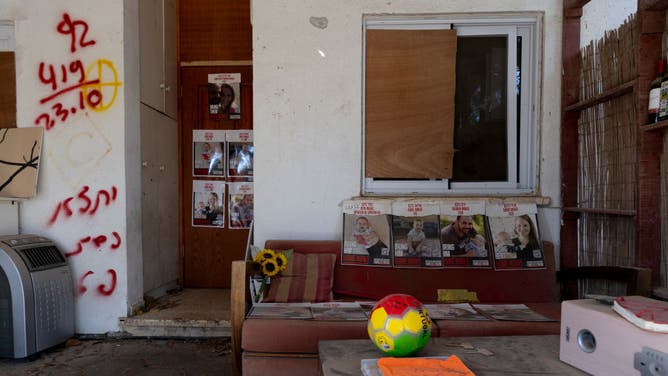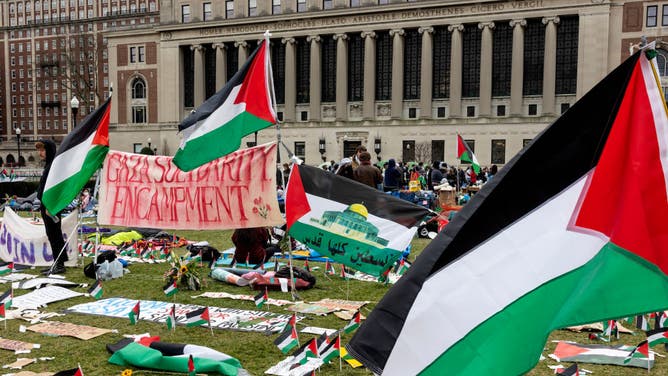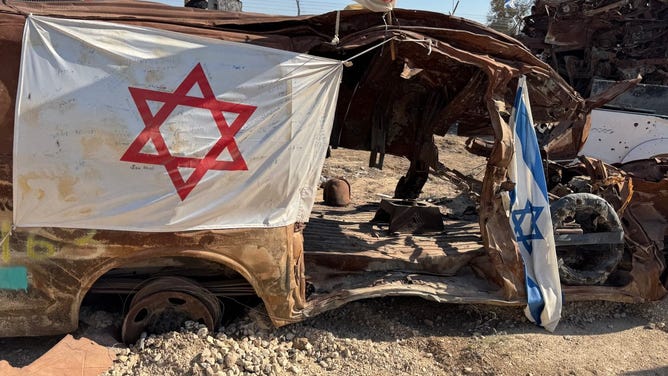We support our Publishers and Content Creators. You can view this story on their website by CLICKING HERE.
Two weeks ago, on December 9th, as part of my week-long trip to Israel, I toured Nir Oz, a small village on Israel’s border with Gaza. Nir Oz was one of the places attacked by Hamas on October 7th, 2023. Forty one people were murdered that day in the tiny community and forty hostages still remain held captive by Gaza.
The terror attack began that morning at dawn, when rockets were fired from Hamas all over Israel.
The people of Nir Oz all rushed to their bomb shelters. Moms and dads, grandmas and grandpas, all the residents of the community huddled inside. Sadly, rocket attacks are common. When I asked a resident why anyone would choose to live this close to Gaza, he responded, “Other than the rocket attacks, it’s an amazing place to live.”
But on that day it wasn’t just rocket attacks.
Hamas terrorists came too.

Photos hang at the entrance to the house of the Bibas family, who were kidnaped during the deadly Oct 7 Hamas attack and are held hostage in the Gaza Strip on December 5, 2024 in Nir Oz, Israel.(Photo by Amir Levy/Getty Images)
They penetrated the protective fence surrounding the community and began to rape, murder and kidnap the residents of Nir Oz. Terrified residents huddled in their bomb shelters, holding the doors shut with all their might and refusing to come out.
So Hamas terrorists began to light their homes on fire.
As the smoke poured into the bomb shelters, which were never built to withstand fire, parents, grandparents and their children faced an impossible choice, leave the bomb shelter to face murder, rape and kidnap, or stay inside and die of smoke inhalation.
One family stayed inside.
I stood outside their burned home.
The mother and father were murdered, bullets fired through the door of their shelter, piercing their bodies. Their three young children suffocated behind them.
Their family photo on the side of the home bears witness to what happened inside.
All of them were murdered in 2023 for being Jewish.
Today, when you visit Nir Oz, it’s eerily quiet, sun-dappled, hauntingly beautiful in its stillness, frozen in time on that terrible day.
A soccer ball is still on the front porch of a murdered family’s home. A trampoline, covered in leaves, hasn’t been used by a young family since that day when the family was murdered. A basketball rests against a basketball hoop outside an elementary school. Children’s toys on the playground are scattered everywhere beneath a concrete roof, untouched since that day, peacetime relics in a time of war. The concrete roof encircles the elementary school so that kids would be at least somewhat protected from the rocket attacks that come all too frequently.
Standing on a concrete porch, the only part left of the home of two murdered residents, Nir Metzger, whose mother and father were kidnapped as he and his family hid inside their bomb shelter for seven hours on that day, and I looked out over Gaza.
Occasionally Metzger’s phone went off as we talked, playing an American song, “Regulate” by Nate Dogg and Warren G, an old school staple of 1990’s era rap, the time when Nir grew up in Nir Oz. He’s 48 years old and has spent his entire life in the kibbutz. For 14 months, he’s been unable to escape that day, but he feels compelled to bear witness to what happened that day, even as his father has died in captivity, even as his own mother, now returned from captivity, remains unable to escape what happened to her and her family.
I asked him why he wanted to talk to me.
“We are the front lines of western civilization. If we fall, the world falls, we cannot fall.”
I think he’s right.
In fact, I’m sure he’s right.
And that’s why I wanted to go to Israel, I wanted to see everything with my own eyes and I wanted to bring you the stories of what I saw.
…
Some of you are going to roll your eyes.
I get it.
Many of you initially started coming to Outkick 14 years ago because you wanted drinking games for college football games.
What in the world, some of you are asking, am I doing here writing about Israel in a time of war, about terror attacks? Shouldn’t I be writing about the college football playoff, isn’t that more my speed?
I get it.
Trust me.
Sometimes I wonder how in the world I ended up doing what I do.
But do you know where I spent October 7th, 2023?
At the Alabama-Texas A&M game in College Station.
I first heard about the terror attack early that morning, as I sat with my boys traveling to a college football game.
And the dad in me has been unable to stop thinking about those other moms and dads, the grandmas and grandpas, who spent that day trying to save their families from the most murderous day for Jewish people since the Holocaust.
Can you imagine what it’s like to be in a tiny bomb shelter, holding the door closed with all your might, as terrorists murder your friends and families and try to murder you?
All because you happen to be Jewish?
Even a year later, I can’t stop thinking about it.
I’ve been deeply impacted by what I saw on October 7th, but even more so by what I’ve seen in America since October 7th. My own college, George Washington University, had one of the largest and most consistent anti-Israel student protests in the country. GW, a school with a huge Jewish population, a school where a generation ago when I attended it even seemed like everyone was Jewish on campus, had anti-semitic statements emblazoned on the side of our campus library, a library, mind you, donated in the name of Holocaust survivors.
The statue of George Washington in the center of campus was draped in a keffiyeh.
The protest was so all-encompassing that after the central quad was cleared they felt compelled to put up a fence around the campus to prevent a continuing protest.
How did this happen?
How did a world which had been raised on the legacy of the Holocaust, steeped in the Never-Again narrative, end up allowing it to happen again?

Pro-Palestinian students occupy a central lawn on the Columbia University campus in New York City. (Photo by Andrew Lichtenstein/Corbis via Getty Images)
Even worse, how did we go in the space of a generation from a school I attended being an open and free collegiate environment where Jewish and Muslim students existed in relative harmony – everyone basically got along both in school and socially – to a place where an actual terror attack was cheered and Israel was seen as the bad guy?
How did so many in America, a country that has been the greatest force supporting basic human rights for all people around the world, lose the ability to distinguish between good and evil? It’s not just in this situation, by the way, it’s also in the response to the execution of the United Healthcare CEO, where majorities of young people believe it’s justified, and where the assassin is cheered by the crowd watching Saturday Night Live. It’s in the celebration of the would-be Donald Trump assassin. Many in our country and around the world have lost the ability to distinguish between good and evil.
And if we can no longer tell good from evil, how can western civilization survive?
It’s a hard thing to think about, I get it.
It’s Christmas season, after all, many of you just want to celebrate with your families and not contemplate the true serious things in life.
But I can’t stop thinking about what I saw in Israel and, since most of you aren’t going to be able to see it for yourself, I want to tell you more about what I saw.
…
Another story from October 7th.
Liora Ben Tsur is a mother of three. I meet her at Tekuma, where the burned out cars of murdered Nova music festival attendees are displayed, as an eerie evocation of the horror that day.
On October 7th, Liora was in a maternity ward having just given birth to her third child the day before. That morning she was woken up by news of the attacks. Her husband and two younger children were in one of the villages overrun by terrorists.
Her mother too.
She began to frantically text with her husband and her mother.
Since they had no guns in the house, her husband got the biggest knife he could find and stood by the locked front door, a butcher knife between him and the terrorists.
For hours he waited there, knife in his hand.
Their two young children hid in the house.
They couldn’t leave the home because the terrorists were everywhere in the village, raping, killing, kidnapping. The gunfire kept coming closer and closer to their home. He texted all of this to his wife, as she clutched her day-old baby in the hospital.
No one was coming to save them, so Liora, from her hospital bed, got her two brothers to get in the car and rush to save her husband and her two oldest children. She tells me that as she lay in her maternity bed nursing her baby she feared that it was only going to be she and her baby. She prayed for her family, but thought it might be just the two of them for the rest of her life.
Her husband continued to text her back, but her mother, alarmingly, was no longer responding.
At long last her brothers, former IDF soldiers armed to the teeth, arrived and got her husband and her two youngest children safely out of the village.
Then they went back to look for their mother.
They found her.
She was laying face first on the ground.
Her body was riddled with bullets.
When they turned her over to claim the body, she was clutching a photo of the grandchildren she would never see again.
Fourteen months later, when she tells me this story, Lior has a handgun on her hip.
She carries it everywhere, is never without it.
I ask Lior why.
“Because,” she says, “if they come again, I’m going to be ready.”
…
Everywhere in Israel, a country at war, you see guns.
Rifles, hand guns. Everyone, it seems, is armed.
While we wait in line to buy donuts, three soldiers with rifles on their backs stand in line beside us.
It’s totally commonplace to see.
As a result, many Israelis say, there is very little violent crime, except for the omnipresent terror attacks, which can occur at any point in time.
Just about every Israeli Jew at the age of 18 joins the military for multiple years to serve their country. The same 18-year-old girls joining sororities in the United States, carry weapons and serve in the military in Israel.
As a result, just about every family has soldiers serving in combat.
Many, I learn, are also Americans, dual citizens.
At Har Herzl, Israel’s National Military Cemetery, I meet an American family with five children, the Zemilman’s, that moved to Israel around twenty years ago. They’re standing beside the grave of their son, Ari, killed one year ago in the war.
There are hundreds of fresh graves around us, many decorated with symbols to honor the dead soldiers. On this grave in particular, I’m struck by a Minnesota Vikings flag. Ari had grown up in Minneapolis from ten to fourteen. There he had become a lifelong Vikings fan.
He would watch every Vikings game from Israel. He loved American sports, often waking up his younger brothers in the middle of the night so they could watch together.
Just 32 years old, he died in the war, leaving behind three young children, including a baby born two weeks before he was called up for service on October 7th.
“He would have been really excited about how good a season the Vikings are having,” his dad Rob said.
The last time he saw his newborn baby, the family snapped a photo. Ari holds his baby daughter in his arms. His mother, Lisa, looks at the photo. The baby is staring intently at her father. “It’s really an amazing photo,” Ari’s mother says, “it’s like she knew she was never going to see him again.”
…
Imagine if on September 11th, 2001 we hadn’t just lost thousands to terrorists when the Twin Towers fell, the Pentagon was attacked, and a plane crashed in Shanksville, but we’d also had hundreds of hostages taken.
And if over 430 days later, those hostages were still being held.
Can you imagine what America would be like?
Can you imagine if that terror attack had been, for instance, from a group in Mexico and our hostages were still being held in Mexico?
What would we do then?
That’s what Israel has been doing for the past year.
Israel can’t begin to heal because the wound of the attack is still wide open. No healing can occur until the hostages are home.
In Tel Aviv I meet Malki Shem Tov. His son, Omer, has been held hostage for over a year, turning 21 and 22 in Hamas captivity.
Omer was captured at the Nova music festival, the equivalent of an Israeli Coachella or Bonnaroo, a place where young people had gathered to celebrate music and have a good time. Over 400 Israelis were murdered by Hamas at the site.
It was impossible to escape.

Horrified parents texted and phoned that morning with their children, begging them to rush to safety.
Many were unable to do so because Hamas terrorists had taken over the road and were murdering anyone who attempted to flee.
That day, Omer communicated with his father many times. His father told him about the terror attack, told him to flee, prayed for his safety.
Then the texts from his son stopped.
But his terrified father could still watch his phone on the trackable app. Slowly, at first, then more rapidly, the phone began to move.
Rapidly speeding in the direction of Gaza.
His father frantically texted his son, believing that maybe he was fleeing in a vehicle from the Nova site, that he was going the wrong way. Frantic text after text, call after call, went unanswered. Malki watched in horror as his son’s phone went to the Gaza border and then crossed into Gaza.
Blip, blip, blip, then the tracking stopped.
He’s heard nothing from his son for over 430 days.
His eyes are weary, heavy lidded, pained.
“Can you sleep at all?” I ask him.
“Would you?” he asks me back.
…
When you land in Israel today, the national Israeli airline, El Al, which is the only airline still flying from the United States to Israel, says as you touch down on the ground in the country, “Welcome to Israel, bring our hostages home.”
As you walk through the Tel Aviv airport, posters of the hostages line the terminal walkway.
At customs, an eerie feeling, at the dividing line between Israeli and foreign visitors, myself and our radio show producer and engineer, Ali and Andrew, are the only foreigners in line for customs on the foreigner entrance.
For the entire time we will travel throughout Israel from the border with Lebanon in the north to the border with Gaza in the South, we will meet virtually no Americans or foreigners at all.
Israel, in many ways, is sealed off from the outside world, fighting a war all on its own.
At Tel HaShomer Hospital, I met three wounded soldiers, Dan Amir, 55, Ariel Koskashvili, who lost both his legs in a Gaza explosion, and Dana, a 19-year-old shot in the head during a terror attack on a Tel Aviv light rail station.
Dan has one leg and tells me he will see me in 2028 at the paralympic games in Los Angeles.
Ariel, who has lost both his legs, is a big sports fan. His dog, named Tyson, after his favorite boxer Mike Tyson, is with him for his rehab. I ask him if he watched the Jake Paul-Tyson fight.
“Of course,” he said. “Tyson was not very good. I expected better.”
Dana’s mother is with her. They knew a rocket attack from Iran was imminent, but Dana didn’t want to have to spend the rocket attack in the train station because it might take several hours. She wanted to get home to be with her mother in the bomb shelter there. When the final train pulled up, she hopped on.
Shortly thereafter, a terrorist shot her three times, a prelude to the Iranian missile attack.
They told her mother when she got to the hospital that her daughter would likely never speak again.
Two months later, Dana speaks flawless English as she tells me about the terror attack and what it was like to be shot three times.
“She’s my miracle,” says her mother.
…
I’m not an expert on geopolitics, foreign affairs, religion or the history of the Middle East.
I’m not claiming to be any of these things.
I’m just a dad with a website and a radio show who happens to have a pretty big audience.
And while I’m not an expert on anything in the Middle East, I do believe I understand the importance of Western Civilization and supporting all who embrace it.
I’m a lifelong student of history, and one of the lessons I’ve learned from history is this: The people who restrict basic freedoms never end up on the right side of history.
So, no, I didn’t visit Gaza.
I don’t believe I need to visit Gaza, just like I don’t believe I need to visit the Al Qaeda terror camps to know they were on the side of evil when they attacked us on September the 11th.
What Hamas did on October 7th was evil. Israel’s response to evil isn’t evil. It’s necessary to prevent future evil. Do I feel bad for the civilians injured and killed in Gaza? Of course. But Hamas has their blood on its hands. Hamas isn’t just responsible for over a thousand dead in Israel, they’re also responsible for all the dead in Gaza too.
The fact that many in America don’t see this troubles me immensely.
The fact that many American college students protested in support of Gaza and Hamas and against Israel is, to me, indefensible.
And, believe me, all the Israelis knew about the protests.
They saw all of it.
Imagine what you’d think if your family had been attacked by terrorists and you saw Americans protesting in favor of the terrorists. I asked Nir Metzger about that.
I traveled the length and width of Israel during the week I was there.
I heard the Muslim prayer sirens echoing all over Israel, including in the holy city of Jerusalem where the majority of the population in the center of the city is actually Muslim.
In fact, do you know who the freest Muslims are in the Middle East?
The ones who live in Israel.
Muslims in Israel are free to be gay or straight, trans even. They have complete and total freedom of religion and freedom of expression. What does it say about Israel’s embrace of western civilization that the freest Muslims live in Israel?
Maybe I’m crazy, but I want all Muslims around the world to have the same basic human rights that you and I have in America, that they all have in Israel.
Indeed, the reason why Hamas and Al Qaeda and terrorists around the world hate western civilization so much is because our success demonstrates the futility of their authoritarian, dogmatic world view. I truly believe most Arabs understand this, they often hate their governments too.
America’s Muslims are freer than Muslims in their home countries. Israel’s too.
Here’s an important point that sums up life in Israel – if Israel put down all its weapons today, every Jew would be murdered, kidnapped or dead within weeks. If every country in the rest of the Middle East put down their weapons, there would be peace.
Iran’s stated objective is to kill every Jew. That’s the entire basis of its existence according to the Ayatollah. That’s where the money for Hamas and Hezbollah comes.
Back in Nir Oz on that day with Nir Metzger, I ask what he wants to happen with their kibbutz, what is the future of his home, can they really stay this close to Hamas, just over a mile from people who raped, murdered and kidnapped his neighbors, who killed his own father?
As we look out over Gaza in the distance, he tells me. “I want Nir Oz to be bigger and better than it has ever been before. We have to rebuild. Because I want people in Gaza to see it. I want them to know they failed. That they will always fail. That we are going to triumph, that Israel will not die.”
If you care about basic human rights and western civilization, let’s all pray he’s right.
But speaking personally, I will be on the side of Israel for the rest of my life.
I hope all of you will be too.
…
My trip to Israel was organized and sponsored by the International Fellowship of Christians and Jews. The IFCJ builds bomb shelters, hospitals, supports wounded soldiers, distributes food and meals to the impoverished and generally acts as a force for good in Israel.
You can read about their good work at SupportIFCJ.org.

 Conservative
Conservative  Search
Search Trending
Trending Current News
Current News 





